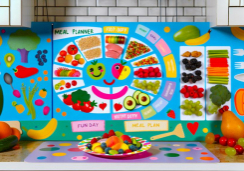Beginner's Guide to Low-Carb Meal Planning
You've likely heard the saying, 'You are what you eat,' and if you're setting your sights on a low-carb lifestyle, you're about to embark on a transformative journey that begins at your dinner plate.
As you weigh the merits of cutting carbs, you'll find that meal planning is your compass, guiding you through a thicket of dietary choices toward a clearer path of health and vitality. With a low-carb diet, you're not just subtracting ingredients; you're reshaping your relationship with food.
You'll need to discern which foods to embrace, which to avoid, and how to balance your plate with proteins, fats, and select carbohydrates that align with your goals. But before you can confidently swap out the spaghetti for spiralized zucchini, let's peel back the layers of meal planning, uncover the essential staples of a low-carb pantry, and address the common pitfalls you might encounter.
Stick with me, and you'll discover how to create meals that are as nutritious as they are delectable, and why mastering the art of low-carb meal planning could be the keystone to unlocking a healthier you.
Understanding Low-Carb Diets
When you embark on a low-carb diet, you'll primarily cut back on carbohydrates while boosting your intake of protein and healthy fats, a shift that can lead to weight loss and improved management of conditions like type 2 diabetes. A low-carb meal plan doesn't mean you'll reach a state of ketosis, which is more specific to keto diets, but it does mean you'll be consuming fewer carbs per day. Typically, this means aiming for around 50-150 grams of carbohydrates per day, depending on your personal goals and activity level.
It's essential to focus on the quality of the carbs you do eat. Opt for nutrient-dense, high-fiber choices that provide grams of net carbs, which subtract fiber from the total carbohydrates, to aid in fullness and digestion. This eating plan also encourages you to minimize sugar and starches while embracing natural fats, which studies show aren't as harmful as once feared.
Adopting a low carbohydrate diet is increasingly recognized for its potential benefits on body weight and health. Not only can it assist with weight loss, but it may also help those with type 2 diabetes and can alleviate symptoms for some individuals with irritable bowel syndrome.
Essential Low-Carb Foods
Understanding the principles of a low-carb diet sets the stage for identifying the foods that will form the cornerstone of your daily meals. As you embark on a low-carb challenge, your low-carb meal plan should emphasize foods that are rich in nutrients yet low in carbohydrates.
Here's a list of essential low-carb foods to include:
- Protein Sources: Meat, fish, and eggs provide vital protein without the excess carbs.
- Above-Ground Vegetables: Opt for leafy greens and cruciferous veggies like cauliflower, which can be transformed into a delicious cauliflower rice.
- Natural Fats: Incorporate avocados and nuts, which supply healthy fats and are satisfying.
- Dairy: Choose high-fat versions like cheese and butter for added flavor and fewer grams of carbs.
- Condiments: Use spices, herbs, and sugar-free sauces to enhance your low carb recipes.
A balanced low-carb diet doesn't just focus on eating fewer carbs; it's about making smart food choices that limit carbohydrates per day while ensuring you get the nutrients your body needs.
Avoid high-carb foods such as grains, high-sugar fruits, starchy vegetables, and legumes. Remember, low carbohydrate diets should be nutrient-focused, so prioritize quality and variety within your low carb foods selection.
Planning Your Low-Carb Week
Embarking on a low-carb lifestyle requires strategic planning to ensure your weekly menu includes balanced meals rich in proteins and healthy fats while keeping carbs in check. When crafting your low carb diet meal plan, aim for a mix of high-quality proteins, such as lean meats and fish, and power your body with fats from sources like avocados and nuts. These will help you stay full and satisfied while managing your carbs per day.
Meal-prepping can be a game-changer, allowing you to have convenient, low-carb foods at the ready. This practice curbs the temptation to reach for high-carb snacks when hunger strikes. Be diligent in avoiding hidden sugars and carbs by reading food labels carefully, contributing to better weight loss outcomes on low-carb diets.
Calories still count, so ensure your eating plan isn't just low in carbs but also balanced calorically for your needs. If you're unsure how to start or adjust your meal plan, don't hesitate to consult a registered dietitian. They can provide personalized guidance to fit your goals, ensuring your low-carb diet is both satisfying and nutritionally sound.
Overcoming Common Challenges
While meticulously planning your low-carb meals is a step in the right direction, it's equally important to prepare for the challenges that might arise as your body adapts to this new way of eating. Transitioning to a low-carb diet can lead to weight loss and health benefits, but you may face hurdles along the way.
Here's how you can overcome common challenges:
- Stay Hydrated and Mind Your Electrolytes: Combat headaches and fatigue by drinking plenty of water and ensuring you're getting enough salt.
- Listen to Your Body: If you're experiencing persistent issues like dizziness or irritability, seek professional guidance to adjust your meal plan.
- Embrace Healthy Fats: Don't fear fats. Include a variety of natural fats to feel satisfied and maintain energy levels.
- Educate Yourself on Hidden Carbs: Read labels to avoid sugars and high-carb additives in processed foods.
- Protein Intake: Ensure your personalized meal plan includes adequate grams of protein to preserve muscle mass and curb the need to snack.
Maintaining a Low-Carb Lifestyle
Maintaining a low-carb lifestyle requires consistent attention to your dietary choices, ensuring you prioritize protein and healthy fats while minimizing sugar and starches. Crafting meal plans designed for a low-carb diet is crucial in sticking to your goals. You'll want to aim for a specific number of carbs per day, which can vary depending on whether you're following a strict keto meal plan or simply aiming to eat low-carb.
Incorporating delicious low-carb recipes into your routine can make the diet more enjoyable and sustainable. Remember, the goal isn't just about restricting calories; it's about choosing foods that fuel your body and support your health. A well-formulated carbohydrate diet can positively affect energy levels, contribute to weight loss, and assist in weight loss maintenance.
Studies show that there's no need to shy away from natural fats. Instead, focus on quality sources of fat and protein while reducing your intake of sugar and starches. Stay hydrated, read food labels carefully, and include regular physical activity. With these strategies, a low-carb lifestyle can be a balanced and effective diet for weight loss and overall health.
Frequently Asked Questions
How Do I Start a Low-Carb Diet for Beginners?
To start a low-carb diet, focus on carb counting, meal prepping, and portion control. Prioritize fat intake, protein sources, and vegetable selection. Choose sugar alternatives, healthy snack options, and consider hydration when eating out.
What Can You Eat the First Week of a Low-Carb Diet?
You'll enjoy eggs for breakfast, meat options, various veggie choices, and cheese varieties. Include nuts, seeds, seafood, leafy greens, and high-fat dairy. Opt for carb alternatives and don't forget the importance of staying hydrated.
What Are 5 Foods to Avoid on Low-Carb Diet?
You'll want to avoid grain-based pastas, sugary cereals, starchy vegetables, tropical fruits, and refined flours. Also, skip high sugar juices, processed snacks, sweetened yogurts, flavored milks, and traditional baked goods on a low-carb diet.
What Is the Number 1 Carb to Avoid?
You should primarily avoid sugar, including sweetened beverages, high sugar snacks, and fruit juice sugars, to maintain a balanced low-carb diet and prevent the negative effects of candy consumption and low fiber pitfalls.
Conclusion
Now that you're equipped with low-carb essentials and a 30-day plan, you're ready to embark on this nutritional journey.
Remember to balance your meals, stay hydrated, and consult healthcare experts to tailor your diet to your needs.
Overcoming challenges is part of the process, so be patient and adaptable.
With these strategies, you'll sustain a low-carb lifestyle that supports your health goals.
Keep learning and stay committed to your well-being.
You've got this!










